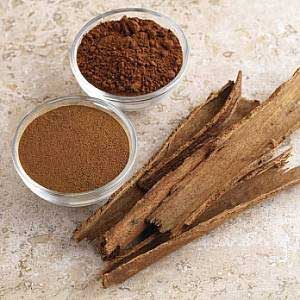For today’s post, I happened to find an interesting article that was just recently published in the medical journal, Diabetic Medicine: A Journal of the British Diabetic Association regarding the health benefits of cinnamon supplementation. No, I’m not talking about Cinnamon toast, or the cereal called Cinnamon Toast Crunch either…
Researchers in London conducted a study involving 58 patients with type 2 diabetes (25 males, 33 females) over a period 12 weeks. For inclusion in this study, the participants had to have a Hemoglobin A1C level of greater than 7%. Hemoglobin A1C is a marker of long-term glycemic control in those who have diabetes.
Here’s a simple description of HBA1C from Medicine.net:
To explain what an A1c is, think in simple terms. Sugar sticks, and when it’s around for a long time, it’s harder to get it off. In the body, sugar sticks too, particularly to proteins. The red blood cells that circulate in the body live for about three months before they die. When sugar sticks to these cells, it gives us an idea of how much sugar has been around for the preceding three months.
In most labs, the normal range is 4-5.9 %. In poorly controlled diabetes, its 8.0% or above, and in well controlled patients it’s less than 7.0%. The benefits of measuring A1c is that is gives a more reasonable view of what’s happening over the course of time (3 months), and the value does not bounce as much as finger stick blood sugar measurements.
Cinnamon intervention:
For the randomized, placebo-controlled intervention in this study, subjects were given either placebo or 2g of cinnamon per day for the duration of this study (12 weeks).
What did the researchers find?
- After intervention, the mean HbA1c was significantly decreased (P<0.005) in the cinnamon group (8.22% to 7.86%) compared with placebo group (8.55% to 8.68%).
- Mean systolic and diastolic blood pressures (SBP and DBP) were also significantly reduced (P<0.001) after 12 weeks in the cinnamon group (SBP: 132.6 to 129.2 mmHg and DBP: 85.2 to 80.2 mmHg) compared with the placebo group (SBP: 134.5 to 134.9 mmHg and DBP: 86.8 to 86.1 mmHg).
- A significant reduction in fasting plasma glucose (FPG), waist circumference and body mass index (BMI) was observed at week 12 compared to baseline in the cinnamon group, however, the changes were not significant when compared to placebo group.
- No significant differences in serum lipid profiles of total cholesterol, triglycerides, HDL and LDL cholesterols neither between nor within the groups.
Study author conclusions:
“Intake of 2g of cinnamon for 12 weeks significantly reduces the HbA1c, SBP and DBP among poorly controlled type 2 diabetes patients.
Cinnamon supplementation could be considered as an additional dietary supplement option to regulate blood glucose and blood pressure levels along with conventional medications to treat type 2 diabetes mellitus.“
Previous research by a group in Germany (Mang et al, 2006) found that a cinnamon extract corresponding to 3 grams per day of cinnamon had a moderate effect on lowering blood sugar levels in poorly controlled diabetics (who continued their medication) after 4 months of supplementation.
Bottom line: Both type 2 diabetes and high blood pressure are significant risk factors for cardiovascular disease. New research suggests that adding cinnamon to your diet (for those with type 2 diabetes) may be effective at helping to lower your blood sugar and blood pressure levels.
References:
- Akilen R, Tsiami A, Devendra D, Robinson N. Glycated haemoglobin and blood pressure-lowering effect of cinnamon in multi-ethnic Type 2 diabetic patients in the UK: a randomized, placebo-controlled, double-blind clinical trial. Diabet Med. 2010 Oct;27(10):1159-67.
- Mang B, Wolters M, Schmitt B, Kelb K, Lichtinghagen R, Stichtenoth DO, Hahn A. ffects of a cinnamon extract on plasma glucose, HbA, and serum lipids in diabetes mellitus type 2.Eur J Clin Invest. 2006 May;36(5):340-4.






